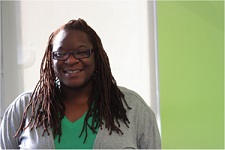What do you get when you combine an experienced charter school leader with a new model that mixes multi-classroom leaders and blended learning in a high-need school? At charter management organization Touchstone Education, you get nimble teachers, quick to adjust their models as needed, and some great student results.
“We have learned that the one most important thing we can do to positively impact the learning of a child is to consistently provide them with a great teacher,” says Ben Rayer, Touchstone’s founder and CEO, and former president of Mastery Charter Schools. “In our model, we have reframed what teachers do and how they are developed.”
Touchstone opened its first site in fall 2012, Merit Preparatory Charter School in Newark, N.J. The school started small, with 84 sixth-graders, so it could quickly adjust and learn from its efforts. In its first year, with a student population that is 90 percent low-income and was generally several years behind grade level, Merit Prep Newark showed great growth in reading and science: By March 2013 tests, students already demonstrated two years of growth in reading and 1.25 years of growth in science.
 Its reading scores came out of an English language arts program led by a “master teacher,” an excellent teacher who taught with and led a first-year teacher. In Public Impact’s latest Opportunity Culture case study, Touchstone Education: New Charter With Experienced Leader Learns From Extending Teachers’ Reach, we look at how this teacher, Tiffany McAfee (at right), led the school’s teachers in their focus on literacy, and how the school combined her leadership with online instruction.
Its reading scores came out of an English language arts program led by a “master teacher,” an excellent teacher who taught with and led a first-year teacher. In Public Impact’s latest Opportunity Culture case study, Touchstone Education: New Charter With Experienced Leader Learns From Extending Teachers’ Reach, we look at how this teacher, Tiffany McAfee (at right), led the school’s teachers in their focus on literacy, and how the school combined her leadership with online instruction.
In math, where Touchstone leaders were unable to hire a master teacher last year, Merit Prep’s students had made three-fourths of a year of growth by March—solid results, but not enough to close achievement gaps. Touchstone plans to develop the math team in the next year, in hopes of achieving results similar to the other subjects.
Touchstone has big plans for growth. At full capacity, Merit Prep Newark will have 560 students in grades 6–12, and Touchstone intends to open 50 schools in seven years, ultimately reaching 30,000 students.
Merit Prep Newark is in the early stages of intentionally creating an Opportunity Culture for teachers. As it and Touchstone scale up, they plan to extend the reach of their excellent teachers to many more students than they reach now. Touchstone uses versions of two Opportunity Culture models, Multi-Classroom Leadership and Time-Technology Swap.
Touchstone’s Time-Technology Swap engages students in digital learning for a part of their day to enable great teachers to reach more students and focus on teaching higher-order thinking skills. This case study provides details of how Merit Prep’s students move through the day between in-person and online teaching, and how its teachers incorporated the online portions.
At scale, Touchstone’s schools will meet the five Reach Extension Principles of an Opportunity Culture, which call for reaching more students with excellent teaching, higher pay, sustainable funding, job-embedded development opportunity, and enhanced authority and clear accountability for great teachers.
Merit Prep’s master teachers will teach with and develop teams of novice and developing teachers. Touchstone’s career ladder enables consistently excellent teachers to climb to the “master teacher” position, in which they can earn up to $100,000 a year without leaving the classroom, within per-pupil funding.
Master Teacher McAfee still sounds slightly amazed at the pay possibilities this model offers.
“I think the sky is the limit. I never would have thought that about teacher salary—usually, it’s, ‘I’m going to cap out soon as a teacher. I do it because I love it, etc.,’” she says. “But to actually think that I could be paid what I’m worth is the best feeling in the world. Teachers are so underappreciated and devalued, especially ELA teachers.”
Touchstone Education: New Charter with Experienced Leader Learns From Extending Teachers’ Reach was co-authored by Sharon Kebschull Barrett and Jiye Grace Han, with contributions from Public Impact’s Joe Ableidinger, Bryan C. Hassel, and Emily Ayscue Hassel.
